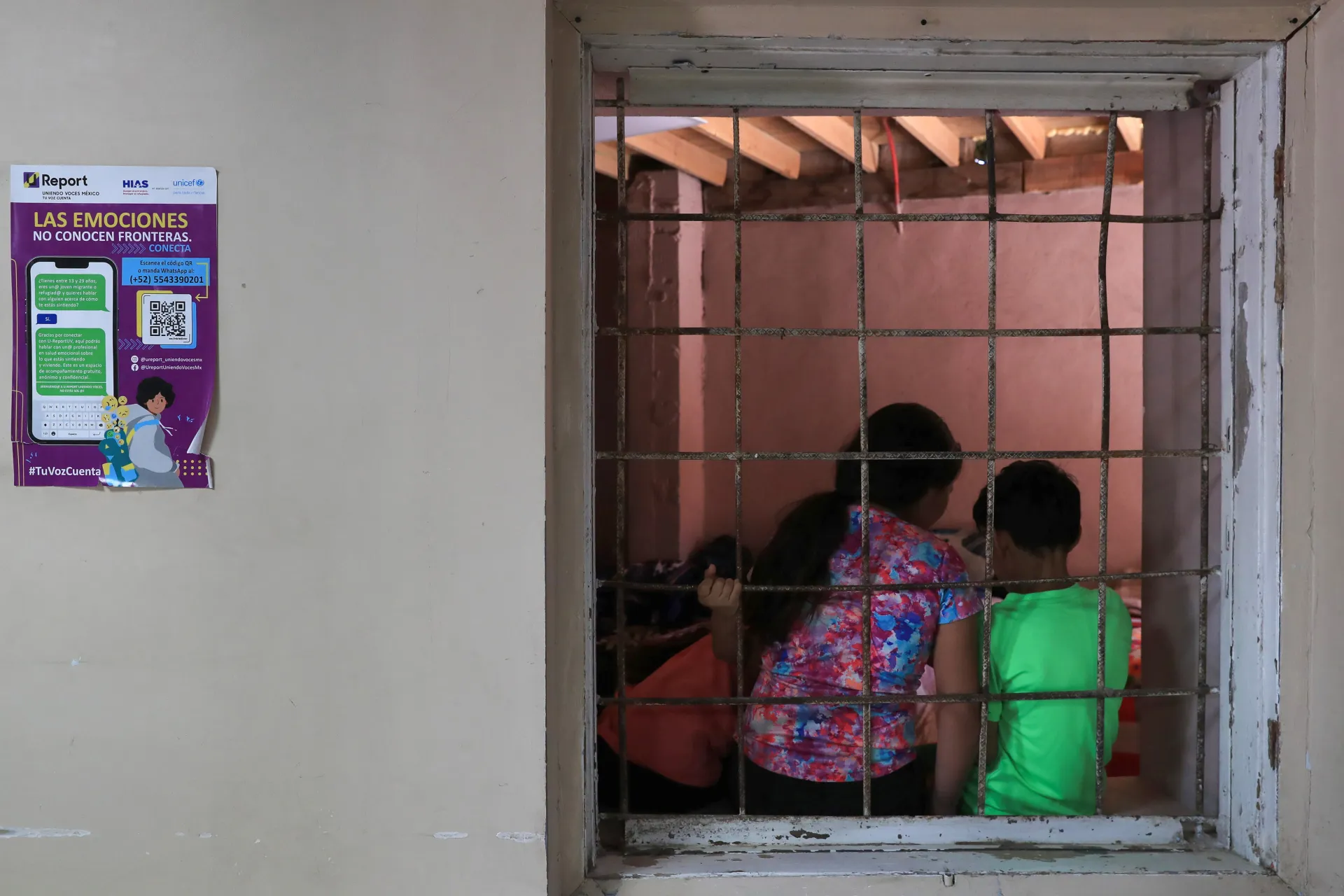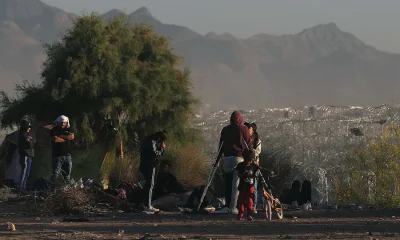International
Desolation at the Mexican border in the face of the new restrictions on asylum in the United States

The new standards for applying for asylum announced this week by the United States Government arouse desolation among activists and migrants who wait in shelters or next to the Rio Bravo, on the northern border of Mexico.
Pastor Gigio Heredia, representative of the Humanitarian Hub Center in Ciudad Juárez, bordering El Paso, warned EFE that this measure will cause more and more migrants to cross irregularly through the Rio Bravo with the risks that this entails.
“We have seen it again and again, every time migrants arrive here with us we see that, encountering so many restrictions, seeing all the refusals to be able to get to the place where they thought since they left their places, it is a strong blow to the mood and especially to the dreams they had,” he said.
The activist referred to the rule promulgated by the Joe Biden Government to instruct migrant agents to prohibit people considered a “risk to public or national security” from applying for asylum and being, therefore, admitted within the United States, although the rule is still under review.
These filters are already applied when studying asylum cases, but this new measure allows them to be used during the “credible fear” interview phase, where it is decided if a person meets the requirements to request protection after crossing the border with Mexico.
The rule has consequences for border cities in Mexico, such as Ciudad Juárez, since “every decision made by the United States Government on the migration issue in one way or another has repercussions on the border, since this would close the door to many families who would have to stay,” according to Heredia.
The religious pointed out that, when faced with so many laws and restrictions, migrants go into despair. For this reason, they take riskier routes and expose themselves to organized crime.
“They are a prisoner for organized crime since they are vulnerable, we have had many cases where we have seen that their belongings have been stolen, where they have been outraged they have been threatened and that is a risk for them,” he said.
Likewise, he considered that “they would be forced to spend some time here and that would cause contingencies, a greater number of migrants stranded here at the border.”
The rules occur in the midst of growing operations to stop migrants in the United States and Mexico. In the first quarter of 2024, irregular migration intercepted by the Mexican Government grew by about 200% per year to almost 360,000.
Biden and Mexican President Andrés Manuel López Obrador agreed at the end of April to “work together to immediately implement concrete measures in order to significantly reduce irregular border crossings and at the same time protect human rights.”
This already has effects on migrants such as Denis Ramos. A Guatemalan who has been waiting for four months in a hostel in Juárez for his appointment to enter the United States.
For him, the news of the tightening of the rules for applying for asylum is “very hard”.
“It is quite complicated for those of us who are already here, as well as for those who are on their way, because there are some who are not aware of the news and every day it gets a little more complicated,” the migrant told EFE.
He added that many travel companions are already desperate in the face of the difficulty of the journey, so they prefer to risk an irregular crossing.
“We who come from Guatemala, which is a neighboring country, feel that it is ‘very distant’ (too far away), let’s not say they come from Colombia, Venezuela, from different countries of the world. The course of the trip already brings them desperate and that leads them to surrender once and for all,” he said.
International
U.S. Senate Rejects Budget, Bringing Government Closer to Shutdown Amid DHS Dispute

The U.S. Senate voted on Thursday against a budget proposal in a move aimed at pressuring changes at the Department of Homeland Security (DHS), following the killing of two civilians during a deployment of immigration agents in Minneapolis.
All Senate Democrats and seven Republican lawmakers voted against the bill, which requires 60 votes to advance, pushing the country closer to a partial government shutdown that would cut funding for several agencies, including the Pentagon and the Department of Health.
The rejection came as Senate leaders and the White House continue negotiations on a separate funding package for DHS that would allow reforms to the agency. Proposed measures include banning Immigration and Customs Enforcement (ICE) agents from wearing face coverings and requiring them to use body-worn cameras during operations.
The vote took place just hours after President Donald Trump said he was “close” to reaching an agreement with Democrats and did not believe the federal government would face another shutdown, following last year’s record stoppage.
“I don’t think the Democrats want a shutdown either, so we’ll work in a bipartisan way to avoid it. Hopefully, there will be no government shutdown. We’re working on that right now,” Trump said during a Cabinet meeting at the White House.
International
Trump Says Putin Agreed to One-Week Halt in Attacks on Ukraine Amid Extreme Cold

U.S. President Donald Trump said on Thursday that he secured a commitment from Russian President Vladimir Putinto halt attacks against Ukraine for one week, citing extreme weather conditions affecting the region.
“Because of the extreme cold (…) I personally asked Putin not to attack Kyiv or other cities and towns for a week. And he agreed. He was very pleasant,” Trump said during a Cabinet meeting broadcast by the White House.
Trump acknowledged that several advisers had questioned the decision to make the call.
“A lot of people told me not to waste the call because they wouldn’t agree. And he accepted. And we’re very happy they did, because they don’t need missiles hitting their towns and cities,” the president said.
According to Trump, Ukrainian authorities reacted with surprise to the announcement but welcomed the possibility of a temporary ceasefire.
“It’s extraordinarily cold, record cold (…) They say they’ve never experienced cold like this,” he added.
Ukrainian President Volodymyr Zelensky later commented on the announcement, expressing hope that the agreement would be honored.
International
Storm Kristin Kills Five in Portugal, Leaves Nearly 500,000 Without Power

Storm Kristin, which battered Portugal with heavy rain and strong winds early Wednesday, has left at least five people dead, while nearly half a million residents remained without electricity as of Thursday, according to updated figures from authorities.
The revised death toll was confirmed to AFP by a spokesperson for the National Emergency and Civil Protection Authority (ANPEC). On Wednesday, the agency had reported four fatalities.
Meanwhile, E-Redes, the country’s electricity distribution network operator, said that around 450,000 customers were still without power, particularly in central Portugal.
Emergency services responded to approximately 1,500 incidents between midnight and 8:00 a.m. local time on Wednesday, as the storm caused widespread disruptions.
The Portuguese government described Kristin as an “extreme weather event” that inflicted significant damage across several regions of the country. At the height of the storm, as many as 850,000 households and institutions lost electricity during the early hours of Wednesday.
Several municipalities ordered the closure of schools, many of which remained shut on Thursday due to ongoing adverse conditions.
Ricardo Costa, regional deputy commander of the Leiria Fire Brigade, said residents continue to seek assistance as rainfall persists.
“Even though the rain is not extremely intense, it is causing extensive damage to homes,” he noted.
In Figueira da Foz, a coastal city in central Portugal, strong winds toppled a giant Ferris wheel, underscoring the severity of the storm.
-

 Central America4 days ago
Central America4 days agoGuatemala seizes over a ton of cocaine hidden in flour at Pacific port
-

 International5 days ago
International5 days agoDelcy Rodríguez seeks political agreements after Maduro’s ouster
-

 International4 days ago
International4 days agoHistoric snowstorm paralyzes Toronto after 60 centimeters of snow
-

 Central America3 days ago
Central America3 days agoGuatemala Police Arrest Prison Guard Caught in the Act of Extortion
-

 Central America3 days ago
Central America3 days agoHonduras swears in conservative president Asfura after disputed election
-

 Central America3 days ago
Central America3 days agoBukele leads public trust rankings as UCA survey highlights gains in security
-

 International4 days ago
International4 days agoSpain’s irregular migrant population rises to 840,000, study finds
-

 International5 days ago
International5 days agoFederal immigration agents kill man in Minneapolis, sparking protests and outrage
-

 International1 day ago
International1 day agoFootball Fan Killed in Clashes After Colombian League Match
-

 International3 days ago
International3 days agoWinter Storm Fern Leaves 30 Dead and Over One Million Without Power Across the U.S.
-

 Central America1 day ago
Central America1 day agoGuatemala President Says Starlink Terminal Found Inside Prison
-

 Sin categoría3 days ago
Sin categoría3 days agoEight Killed in Series of Armed Attacks in Ecuador’s Manabí Province
-

 International3 days ago
International3 days agoDoomsday clock moves to 85 seconds before midnight amid rising global risks
-

 International4 days ago
International4 days agoRights group says nearly 6,000 killed in Iran protest crackdown
-

 International1 day ago
International1 day agoMissing Spanish Sailor Rescued After 11 Days Adrift in Mediterranean
-

 International1 day ago
International1 day agoRubio Says U.S. Could Participate in Follow-Up Russia-Ukraine Talks
-

 International3 days ago
International3 days agoSpain approves plan to regularize up to 500,000 migrants in Historic Shift
-

 Sin categoría3 days ago
Sin categoría3 days agoEl Salvador Launches Fourth Year of Ocean Mission to Protect Marine Ecosystems
-

 International4 days ago
International4 days agoVenezuela frees at least 80 political prisoners, NGO says
-

 International4 days ago
International4 days agoEU launches new probe into X over AI-generated fake nude images
-

 International13 hours ago
International13 hours agoU.S. Senate Rejects Budget, Bringing Government Closer to Shutdown Amid DHS Dispute
-

 International4 days ago
International4 days agoSevere winter storm grips U.S., leaves multiple dead as extreme cold persists
-

 International4 days ago
International4 days agoFrance debates ban on social media for children under 15
-

 International13 hours ago
International13 hours agoStorm Kristin Kills Five in Portugal, Leaves Nearly 500,000 Without Power
-

 International13 hours ago
International13 hours agoTrump Says Putin Agreed to One-Week Halt in Attacks on Ukraine Amid Extreme Cold
-

 International13 hours ago
International13 hours agoMan Arrested After Vehicle Crashes Into Jewish Institution in Brooklyn




























